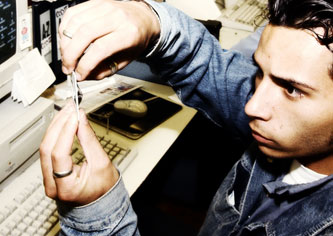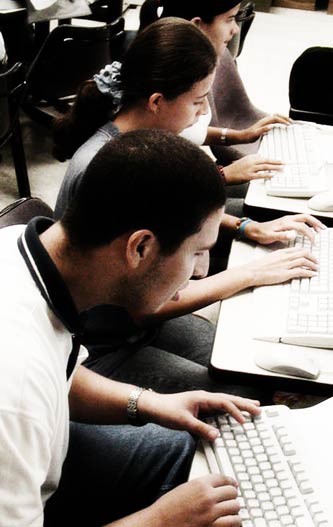Código de acceso, young people and information
Access Code in practice
Young candidates wishing to take part in the Access Code school of journalism are invited to attend a general meeting, which is announced in the newspaper itself. The selection criteria are determined by the organisations taking part in the initiative. These criteria take into account the socio-economic background of the applicants (to include applicants from the poorest families), the interest they show, their artistic, reading and writing skills, and aptitude.
The Access Code school of journalism currently takes on 80 young people a year from all over the country. Training lasts three months, after which a smaller group of 25 young people are chosen to take a direct part in the operations of the editorial offices of the newspaper for another nine months. 
Training aims to strengthen the capacity of each youngster to take charge of community communication projects directed at resolving basic needs. Training also involves tuition on the rights of children and teenagers and their human and social development.
Training is divided into four cycles: awareness, emphasis, community and social development, production.
All 80 participants take part in the awareness stage, which aims to introduce youngsters into the world of communications and teach them the basic tools of journalism. In this phase, the students are given a grounding in journalism, in which they learn how to interpret news and find out about ethical codes of conduct and some principles of writing, investigative journalism and reporting. They are also given thematic workshops on economics, politics and culture, amongst others, which give them the basics to try their hand at journalistic practices. Most of these capacity building activities are carried out by the journalists working for the newspaper.
The emphasis stage. By this phase, the group has been reduced to 25 young people. Selection of this new group is based on how well they perform in the awareness phase. The youngsters have the chance to learn about different areas of journalism and develop their skills in writing, design, photography, radio and television. Capacity building is conducted directly by specialised journalists in the newspaper’s editorial offices. Once they have found out about all the different areas of the newspaper, the youngsters opt for the one that is of most interest to them or for which they have the greatest capacity, and then try their hand at it during the production phase.
The production phase. The students begin to produce written texts, photos, drawings, broadcasting proposals and radio programmes, assisting the work of the journalists in charge of each group, who can then decide to use some of the ideas put forward by the trainees, channelling them into the paper’s official selection procedures before publication. During these three stages, the youngsters are in permanent contact with their local communities, on the lookout for information to turn into news stories. 
The community and social development stage. Contacts with the local community intensify during the last phase of training, when the participants have the chance to broaden their experience with the Access Code Press Club. The Press Club meets four hours a week for six months, during which Access Code trainees collaborate with school children and students.
Training involves 10 to 15 hours per week. At the same time, participants continue to study their own subjects at university or high school.
Once training is complete, the trainee journalists go on to integrate a network of young people that work on the creation of concrete social development products. Ex-Access Code students can, at present, take part in the Press Club, the Web Page Project, the Creativity Group, which includes photography, and the TV Group.
The one-year training provided by the Access Code school of journalism, together with the chance to support community communication products, means that participants gain a unique experience of life. Although the training they receive in the newspaper does not represent a formal professional preparation that accredits them as journalists, the programme represents an experience of life that allows young people to find out exactly what it is like to work in the press and media.
In economic terms, the initiative is financed by Editorial El Tiempo. As well as allocating financial resources for tutors, capacity builders and coordinators, the publishers also provide premises for the activities. The publishing house has also received financial support from a national non-government association, the Fundación Restrepo Barco, and Plan Internacional. Their contributions as founding members of the Access Code School of Journalism have made the initiative sustainable.
DOWNLOAD THE BROCHURE PDF
english (0.6 MB)spanish (0.6 MB)








 COUNTRY OF ORIGIN
COUNTRY OF ORIGIN